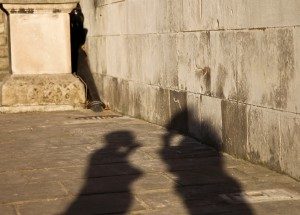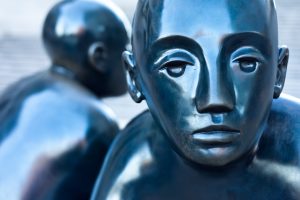 I was recalling a conversation I had with Master Chang a good twenty years ago. I was interviewing him for a martial arts magazine and asked him whether he encourages his Hapkido students to question?
I was recalling a conversation I had with Master Chang a good twenty years ago. I was interviewing him for a martial arts magazine and asked him whether he encourages his Hapkido students to question?
He responded,
“I assume that your question is about the deeper side of the martial arts, not about students understanding the physical reason for a front block? Questioning the deeper side? … No. Honestly speaking student’s questions are irrelevant, they try to attain knowledge by questioning and answering, but martial art training is not this way. Knowledge doesn’t mean much. They should practice until they perceive truth, until they perceive the sense of their discipline or actions – keep on practicing.”
To some, not being encouraged to question may appear strange or even counterproductive to their way of learning. It may promote frustration or may stimulate a student to wonder why, and contemplate the meaning behind his answer.
What do YOU think he meant?
I don’t believe he was discouraging all enquiry, debate and discussion. These can all be useful tools to help unlock negative mental patterns and allow us to look at the world through new perspectives.
My first instinct then, is always to reflect on the meaning of Hapkido. The word itself means, ‘the coordination of mind and body’, or we could say ‘the unification of mind and body’, or ‘total concentration’. It’s perhaps a hard concept to get to grips with but at some level it means that we are fully alive in the present moment; we are in the flow, no longer distracted or separated.
When we question, we try to understand something at an intellectual level. As said, enquiry, debate and discussion can be useful, but if our exploration remains purely cognitive, mind and body remain separate; one could argue that we have distracted ourselves from the experience we are trying to understand. We can all give a dictionary definition of mindfulness for example, but can we actually achieve this state? Perhaps there is something in his answer then about the importance of being able to embody our understanding?
As we progress within Hapkido we grapple with this concept – not only during Hapkido class, but also what that may mean to us in our daily lives.
 So what do I think was at the core of his answer…?
So what do I think was at the core of his answer…?
Perhaps, that most things we must understand can’t be answered outside of ourselves.
The majority of things we need to learn we’re not going to get from someone else.
We must have the courage to look within ourselves.
In my next post I’ll discuss a few of the qualities we can develop that will help us to do just that. In the meantime, if you enjoyed this topic you may also like to read the story of Won Hyo.

As ever your answer improves my understanding but generates even more questions! I’ve read the articles you refer to twice over a period of years. The first time I was flabbergasted that we are expected not to ask questions. So much so that I missed the point entirely. The second time of reading I spotted Grandmasters summing up which was – it is fine for students to ask questions but they shouldn’t always expect the answer. And there I remained until now.
After reading your timely take on the issue I am of the opinion that if I keep coming to class, keep practicing and keep meditating, the answers I seek will become apparent. Having said that I still have a couple of questions for you when next I’m class!
Thanks Yaya. I love your response…
I debated whether to post this article because it could be so easily misinterpreted – I hope it stimulates more comments. Ironic really, that perhaps we need to ‘question’ our own understanding. I don’t believe that there is one true answer… and I know that understanding of a thing develops over time as we mature.
I also like your comment, “it is fine for students to ask questions but they shouldn’t always expect the answer”.
Maybe the point is: of whom are we asking the question? And what type of question?
If we ask deep questions of someone else, we are seeking a transfer of knowledge from them to us. It is hard enough for two native speakers of the same language to communicate thoughts clearly and unambiguously, but how are you supposed to transfer complex feelings and experience? You can’t, at least, not efficiently, so the question won’t yield an answer that is helpful, and therefore distracts you from the task of practising until truth is perceived.
If instead we ask the question of ourselves, I think there is value, provided that it is the right type of question, directed to a useful purpose. For example, if I ask myself what is the quality of my experience when I perform an action one way, and compare that to the quality of how I do it another way, I will direct my mind to ask questions of my own body, which no-one else can answer for me. What I hope to obtain by asking the question is a greater awareness of my own experience in the moment, not external and “intellectual” knowledge.
What can be useful I think is the sharing of experience, not because one student’s experience maps precisely onto anyone else, but because it can prompt further, internal, questioning, and greater awareness. But at the end of the day, your experience of the art remains uniquely yours.
when you cant questin i is a cult, this is common among korean so called masters
Thanks for getting involved in the conversation.
I hear your point – that if you are not being allowed to have an opinion or to disagree this might definitely be seen as cultish. But that’s not what I’m suggesting.
Through the years I have seen many people debating and discussing things in Master Chang’s office. His door is always open, he is very welcoming and encouraging, and at the end of every talk he always asks for questions…
The point I was making… and I believe he was too…. was not that we can’t ask questions, but rather that often we look for answers in the wrong place.
One of the things that I have grown to understand through my Hapkido training is that the journey to an answer is as much a part of the answer.
With google we can often quickly find an answer to a question, just try googling ‘what is the sound of one hand clapping’! But with our answer have we also ordered a side helping of understanding? Have we earned it? Sometimes the answer is not a definative word or sentance but a series of realisations.
I have listened to Master Changs teachings over the years, and yours Saboumnim, and each time I hear a story I discover something new in the telling. Each discovery is an answer of sorts, and is the answer I am capable of understanding at that moment, but who knows what i will discover from the same stories in years to come?
I have never felt dissapointed or prevented from taking that journey of discovery by you, but rather encouraged to, and given the tools to help me on my journey as I go.